|
 Secure Site
Secure Site
|
 |
Archive for the 'Zen Timers' Category
 meditating may change your brain Apparently, people who meditate are a bit thickheaded—in a good way of course. A new study led by Massachusetts General Hospital shows that the regular practice of a particular form of meditation appears to thicken areas of the brain associated with attention and sensory processing.
Brain scans of experienced, frequent meditators showed thickening in the insula, an area of the cortex involved in the integration of emotion with thought. Most of the structural changes occurred in the right hemisphere of the brain, in the prefrontal cortex, which regulates memory and attention. This area tends to thin as we age, and yet the thickening was more pronounced in older practitioners. According to Sara Lazar, PhD, the study’s lead author, this evidence suggests that meditation may slow down the atrophy of certain areas of the brain that typically occurs with age.
Perhaps even more interesting, you needn’t don robes and retire to a cave somewhere to achieve these results. Instead of scanning the brains of Buddhist monks who devote their lives to meditation, researchers enrolled 20 people who averaged nine years of experience and about 40 minutes a day meditating. (Fifteen people with no experience in meditation formed the control group.) Those participants who meditated most deeply—as measured by breathing rates—showed the greatest changes in their brains, which suggests that meditation caused the thickening, as opposed to the thickening indicating a predisposition to meditate.
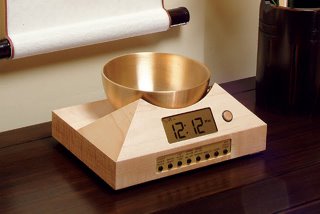 Tibetan Bowel Meditation Timers adapted from Natural Solutions Magazine, August 2006 by Megan Keough
Now & Zen’s Meditation Timer Store
1638 Pearl Street
Boulder, CO 80302
(800) 779-6383
Posted in intention, Meditation Timers, Meditation Tools, mindfulness practice, Well-being, zen monks, Zen Timers
 Cherry Blossoms
Beyond the psychological inquiry into dreams or the self-improvement techniques of affirmations lies the ancient and sacred practice of meditation. Some form of meditation is practiced in every major world religion. Yogis, Christian mystics, Zen Buddhists, Quakers, practitioners of the Kabbalah, and Secular Humanists, all experience the benefits of meditation.
 A Moment of Stillness in Nature
The Zen Timepiece is an exquisite “accoutrement to meditation.” It can be used in a variety of ways to aid your practice and encourage you to “make time” to meditate. The first and most basic use of the Zen Timepiece in your meditation practice is as a signal of the end of your allotted meditation time.
If you want to meditate for twenty minutes, simply set our Chime countdown timer for twenty minutes and begin your meditation. When the countdown timer reaches zero and the bowl/gong is struck, you can choose to end there or continue your meditation for about three and a half minutes until the next bowl strike, or even longer. Many meditators find that a “three and a half minute warning” is a perfect interval in which to gradually conclude their longer meditations. The first strike signals the final phase of the meditation and the second strike its conclusion. The beauty of the brass bowl/gong is that it complements rather than disturbs the meditative state while acting as an effective timer. No matter how you use it, the sonic clarity of the brass bowl provides an appropriate conclusion to your stillness.
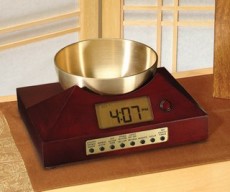 Now & Zen Headquarter Store, Boulder, CO
Now & Zen Headquarter Store, Boulder, CO
The bowl that comes with the Zen Timepiece is made from the following five metals: copper, zinc, lead, iron, and tin. It has been formed using the same forging techniques that have been used in Asia for two thousand years. Unlike hand-hammered Himalayan-style bowls, our Zen Timepiece’s rin gong bowl is made using methods which first appeared in Japan in the first century. Following these traditions, your bowl’s long-resonating tone has been carefully selected to bring beauty and harmony to your environment.
 Clocks and Timers with Gentle, Soothing Chimes
Now & Zen’s Chime Alarm Clock Shop
Home of The Zen Alarm Clock & Zen Timepiece with Singing Bowl
1638 Pearl Street
Boulder, CO 80302
(800) 779-6383
Posted in Japanese Inspired Zen Clocks, Meditation Timers, Meditation Tools, Natural Awakening, Now & Zen Alarm Clocks, Progressive Awakening, Yoga Timers by Now & Zen, Zen Timepiece by Now & Zen, Zen Timers
 Gong Timer - Boost Your Short-Term Memory - Utagawa Toyokuni Ukiyo-e Woodblock A certain type of meditation may help the brain retain images for short periods, says a new study on visual-spatial abilities.
When people view an object, they usually retain a clear picture of it in their visual short-term memory for only a few seconds before the details fade. An experiment by George Mason University researchers, though, found that people who practice Deity Yoga (DY) do much better at visual-spatial tasks shortly after they meditate.
The study’s authors, writing in a recent issue of Psychological Science, said the finding may have “many implications for therapy, treatment of memory loss and mental training.”
Practitioners of DY meditation zero in on an image of their deity, conjuring up a vivid, three-dimensional mental picture of it while honing in on the deity’s emotions and environment.
In the experiment, led by psychologist Maria Kozhevnikov, meditation and non-meditation practitioners performed two visual-spatial tests: imagining the rotation of a 3-D object and viewing an image, then trying to identify it from among several other similar images. After a first round of tests, the participants spent the next 20 minutes either meditating or performing non-meditative tasks before being tested again.
All the subjects had similar scores on the first round of tests, suggesting that meditating in general causes no overall, long-term improvement in visual-spatial skills.
However, those who performed DY meditation between rounds did much better on both tasks in the second phase of tests than those who did non-meditative activities or practiced Open Presence (OP) meditation. OP practitioners, rather than focusing on a specific thing, try to achieve awareness by contemplating a wider array of experiences, images or thoughts that may come to them.
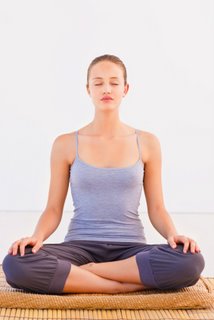 Gong Timer Can Help Boost Your Short-Term Memory if You Use it to Meditate The study authors concluded that further investigations should be done to see if other visual meditation techniques can produce similar improvements in visual-spatial memory or if the results are specific to DY meditation.
More information
The National Center for Complementary and Alternative Medicine has more about the health benefits of meditation.
SOURCE: Association for Psychological Science, news release, April 27, 2009
“Mindfulness” is the spiritual practice of being aware of your present moment. World famous Zen monk Thich Nhat Hanh has developed the use of a bowl-gong in a practice he calls the “mindfulness bell.” When you hear the sound of the mindfulness bell, you are invited to take a moment to breathe in and out and center yourself in the present. This practice allows the sound of the bowl-gong to periodically connect you to the peace and tranquility that resides inside you right now. This delightful practice reduces stress and improves your overall health.
Our Zen Timepiece’s acoustic 6-inch brass bowl-gong clock is the world’s ultimate alarm clock, practice timer, and “mindfulness bell.”
It fills your environment with beautifully complex tones whenever it strikes. In the morning, its exquisite sounds summon your consciousness into awakening with a series of subtle gongs that provide an elegant beginning to your day. Once you experience the Zen Timepiece’s progressive awakening, you’ll never want to wake up any other way. It also serves as the perfect meditation timer. Available in 5 wood styles, including bamboo (shown).
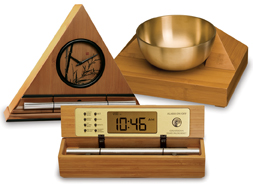 Gong Timers from Now & Zen - Boulder, Colorado Now & Zen – The Gong Timer Store
Downtown Boulder
1638 Pearl Street
Boulder, CO 80302
(800) 779-6383
Posted in Zen Clocks and Dream Recall, Zen Timers
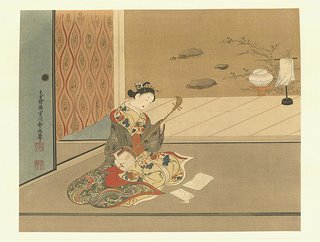 Set Your Gong Meditation Timer - Dama tocando el Samisem -artista Shunsui Katsu-Miyagawa A certain type of meditation may help the brain retain images for short periods, says a new study on visual-spatial abilities.
When people view an object, they usually retain a clear picture of it in their visual short-term memory for only a few seconds before the details fade. An experiment by George Mason University researchers, though, found that people who practice Deity Yoga (DY) do much better at visual-spatial tasks shortly after they meditate.
The study’s authors, writing in a recent issue of Psychological Science, said the finding may have “many implications for therapy, treatment of memory loss and mental training.”
Practitioners of DY meditation zero in on an image of their deity, conjuring up a vivid, three-dimensional mental picture of it while honing in on the deity’s emotions and environment.
In the experiment, led by psychologist Maria Kozhevnikov, meditation and non-meditation practitioners performed two visual-spatial tests: imagining the rotation of a 3-D object and viewing an image, then trying to identify it from among several other similar images. After a first round of tests, the participants spent the next 20 minutes either meditating or performing non-meditative tasks before being tested again.
All the subjects had similar scores on the first round of tests, suggesting that meditating in general causes no overall, long-term improvement in visual-spatial skills.
However, those who performed DY meditation between rounds did much better on both tasks in the second phase of tests than those who did non-meditative activities or practiced Open Presence (OP) meditation. OP practitioners, rather than focusing on a specific thing, try to achieve awareness by contemplating a wider array of experiences, images or thoughts that may come to them.
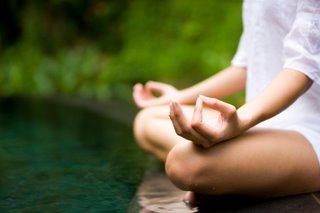 Choose a Gong Meditation Timer for Your Mindfulness Practice The study authors concluded that further investigations should be done to see if other visual meditation techniques can produce similar improvements in visual-spatial memory or if the results are specific to DY meditation.
Use our unique “Zen Clock” which functions as a Yoga & Meditation Timer. It features a long-resonating acoustic chime that brings your meditation or yoga session to a gradual close, preserving the environment of stillness while also acting as an effective time signal.
Our Yoga Timer & Clock can be programmed to chime at the end of the meditation or yoga session or periodically throughout the session as a kind of sonic yantra. The beauty and functionality of the Zen Clock/Timer makes it a meditation tool that can actually help you “make time” for meditation in your life. Bring yourself back to balance.
More information
The National Center for Complementary and Alternative Medicine has more about the health benefits of meditation.
SOURCE: Association for Psychological Science, news release, April 27, 2009
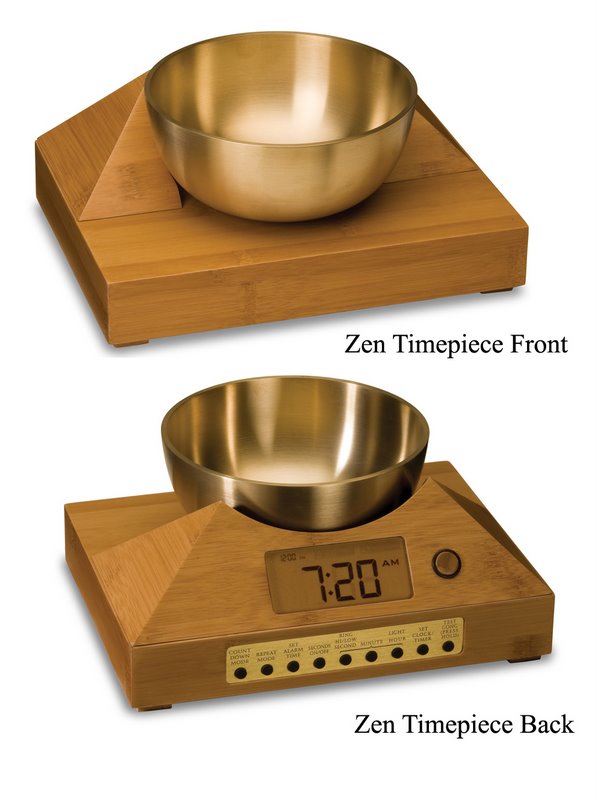 Set Your Gong Meditation Timer for Your Mindfulness Practice Now & Zen – The Gong Meditation Timer
 The Gong Meditation Store - Boulder, CO 1638 Pearl Street
Boulder, CO 80302
(800) 779-6383
orders@now-zen.com
Posted in Well-being, Yoga Timers by Now & Zen, Zen Timepiece by Now & Zen, Zen Timers
 Yoga Clocks and Timers by Now & Zen, Inc. YOGA FOR BEDTIME
Need help sleeping? Doing yoga exercises before bedtime can be just what you need
Sit up in bed comfortably, either with your legs folded or straight in front of you; whatever you can do with the most ease. Sit up and lean slightly back on your pillows or backboard. Close your eyes and rest your hands on your thighs and just breathe here for a few minutes. This doesn’t have to be a serious meditation but just a short while to do nothing but breathe.
Need a Yoga & Meditation timer? Get the natural one: A Bowl-Gong Bamboo Zen Timepiece from Now & Zen
Spiritual practices such as meditation or yoga are best done in an environment of beauty and tranquility. And the clock/timer you use for your practice can make a real difference in creating such an environment. But using a timer with artificial “beeps,” or even “recorded gongs,” coming out of a plastic box can be less than ideal. The Bamboo Zen Timepiece is unlike any other meditation timer on the market because it features a real, natural, acoustic, long-resonating gong, produced by its traditional Japanese style bowl-gong, or “rin-gong”. Moreover, The Zen Timepiece is made with sustainable natural bamboo, so it is as beautiful to see as it is to hear. Once you use a Zen Timepiece, nothing else will do.
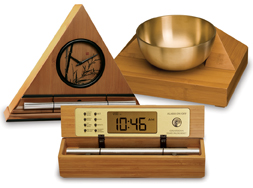 Yoga & Meditation Timer and Clocks Now & Zen – The Yoga Clock & Timer Store
1638 Pearl Street
Boulder, CO 80302
(800) 779-6383
Posted in Bamboo Chime Clocks, Meditation Timers, Meditation Tools, mindfulness practice, Well-being, Yoga Timer, Yoga Timers by Now & Zen, Zen Alarm Clock, Zen Timepiece by Now & Zen, Zen Timers
 Gong Meditation Timers - The Zen Alarm Clock can effect your awareness in a variety of positive ways, all of which require your participation (HealthDay News) — Meditation can take many forms, including the art of deep breathing. It’s a great way to relieve stress.
The American Academy of Family Physicians offers these steps to deep breathing, which helps your body get plenty of oxygen:
Lie on your back on a flat surface.
- Rest one hand on your stomach above your belly button, and the other hand on your chest.
- Breathe in slowly and deeply, making your stomach rise a bit. Hold for a second.
- Slowly exhale, so that your stomach goes back down.
- Set Your Zen Timepiece with Gong to repeat every 2 minutes.
- Repeat several times.
adapted from abcnews.com by By Diana Kohnle
Meditation is generally an inwardly oriented, personal practice, which individuals do by themselves. Meditation may involve invoking or cultivating a feeling or internal state, such as compassion, or attending to a specific focal point. The term can refer to the state itself, as well as to practices or techniques employed to cultivate the state. There are dozens of specific styles of meditation practice; the word meditation may carry different meanings in different contexts. Meditation has been practiced since antiquity as a component of numerous religious traditions. A 2007 study by the U.S. government found that nearly 9.4% of U.S. adults (over 20 million) had practiced meditation within the past 12 months, up from 7.6% (more than 15 million people) in 2002.
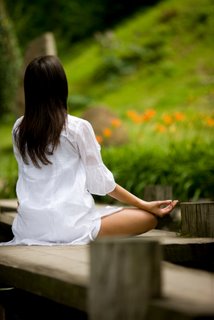 Meditation - The Zen Alarm Clock is a consciousness-raising tool.
Although meditation can be done in almost any context, practitioners usually employ a quiet, tranquil space, a meditation cushion or bench, and some kind of timing device to time the meditation session. Ideally, the more these accoutrements can be integrated the better. Thus, it is conducive to a satisfying meditation practice to have a timer or clock that is tranquil and beautiful. Using a kitchen timer or beeper watch is less than ideal.
And it was with these considerations in mind that we designed our Zen Alarm Clock and practice timer. This unique “Zen Clock” features a long-resonating acoustic chime that brings the meditation session to a gradual close, preserving the environment of stillness while also acting as an effective time signal.
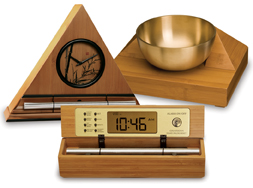 Use our unique "Zen Clock" which functions as a Yoga Timer. It features a long-resonating acoustic chime that brings your meditation or yoga session to a gradual close, preserving the environment of stillness while also acting as an effective time signal.
Now & Zen
The Gong Meditation Clock Shop
Downtown Boulder, Colorado
1638 Pearl Street
Boulder, CO 80302
(800) 779-6383
Posted in Meditation Timers, mindfulness practice, Zen Timepiece by Now & Zen, Zen Timers
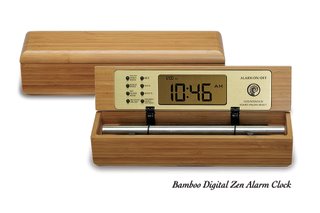 stillness practice tools and timers …that he washes dishes with as much care as he would if he were bathing the newborn Buddha: “If I am incapable of washing dishes joyfully, if I want to finish them quickly so I can go and have a cup of tea, then I will be incapable of drinking the tea joyfully.”
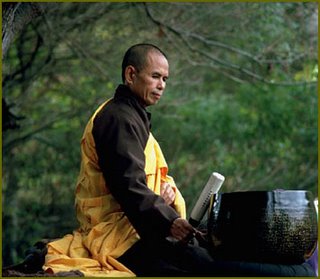 Thich Nhat Hanh Now & Zen – The Gong Meditation Timer Shop
1638 Pearl Street
Boulder, CO 80302
Posted in Bamboo Chime Clocks, zen monks, Zen Timepiece by Now & Zen, Zen Timers
 Re-wire Your Brain for Happiness - Choose a Meditation Timer with Chime A quiet explosion of new research indicating that meditation can physically change the brain in astonishing ways has started to push into mainstream.
Several studies suggest that these changes through meditation can make you happier, less stressed — even nicer to other people. It can help you control your eating habits and even reduce chronic pain, all the while without taking prescription medication.
Meditation is an intimate and intense exercise that can be done solo or in a group, and one study showed that 20 million Americans say they practice meditation. It has been used to help treat addictions, to clear psoriasis and even to treat men with impotence.
The U.S. Marines are testing meditation to see if it makes more focused, effective warriors. Corporate executives at Google, General Mills, Target and Aetna Insurance, as well as students in some of the nation’s classrooms have used meditation.
Various celebrities also are known meditators, including shock jock Howard Stern, actors Richard Gere, Goldie Hawn and Heather Graham, and Rivers Cuomo, the lead singer of the band Weezer.
In one study, a research team from Massachusetts General Hospital looked at the brain scans of 16 people before and after they participated in an eight-week course in mindfulness meditation. The study, published in the January issue of Psychiatry Research: Neuroimaging, concluded that after completing the course, parts of the participants’ brains associated with compassion and self-awareness grew, and parts associated with stress shrank.
Recently, the Dalai Lama granted permission for his monks, who are master mediators, to have their brains studied at the University of Wisconsin, one of the most high-tech brain labs in the world.
Richie Davidson, a PhD at the university, and his colleagues, led the study and said they were amazed by what they found in the monks’ brain activity read-outs. During meditation, electroencephalogram patterns increased and remains higher than the initial baseline taken from a non-meditative state.
But you don’t have to be a monk to benefit from meditation, which is now gaining acceptance in the field of medicine.
 The Most Soothing Meditation Timer and Clock with Chime Physicians have increasingly started prescribing meditation instead of pills to benefit their patients. A Harvard Medical School report released in May found that more than 6 million Americans had been recommended meditation and other mind-body therapies by conventional health care providers.
Perhaps the most mind-bending potential benefit of meditation is that it will actually make practitioners nicer. Chuck Raison, a professor at Emory University, conducted a meditation study in which he hooked up microphones to participants who had been taught basic meditation and those who hadn’t. He then recorded them at random over a period of time. Raison found that these newly-trained mediators used less harsh language than people who had no meditation experience.
“They were more empathic with people,” Raison said. “They were spending more time with other people. They laugh more, you know, all those things. They didn’t use the word ‘I’ as much. They use the word ‘we’ more.”
However, even the Dalai Lama admitted that meditation is not the silver bullet cure-all for every ailment or emotion.
“Occasionally, [I] lose my temper,” he said. “If someone is never lose temper then perhaps that may come from outer space, real strange.”
The Dalai Lama also cautioned that meditation takes patience, so new mediators should not expect immediate results.
“The enlightenment not depend on rank,” he said, laughing. “It depends on practice.”
Some scientists believe that in a generation, Americans will see meditation as being as essential to maintaining a healthy lifestyle as diet and exercise.
Although meditation can be done in almost any context, practitioners usually employ a quiet, tranquil space, a meditation cushion or bench, and some kind of timing device to time the meditation session. Ideally, the more these accoutrements can be integrated the better. Thus, it is conducive to a satisfying meditation practice to have a timer or clock that is tranquil and beautiful. Using a kitchen timer or beeper watch is less than ideal.
And it was with these considerations in mind that we designed our digital Zen Alarm Clock and practice timer. This unique “Zen Clock” features a long-resonating acoustic chime that brings the meditation session to a gradual close, preserving the environment of stillness while also acting as an effective time signal.
adapted from worldnewsreport.com by Maggy Patrick and Lauren Effron
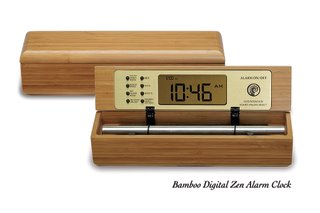 The Most Soothing Meditation Timer and Clock with Acoustic Chime Now & Zen – The Meditation Timer Store
1638 Pearl Street
Boulder, CO 80302
(800) 779-6383
Posted in Meditation Timers, Meditation Tools, Now & Zen Alarm Clocks, Zen Alarm Clock, Zen Timepiece by Now & Zen, Zen Timers
 Meditation Affects Your Body - Set Your Gong Meditation Timer It turns out peaceful thoughts really can influence our bodies, right down to the instructions we receive from our DNA, according to a new study.
Researchers for the study, published in the Public Library of Science, took blood samples from a group of 19 people who habitually meditated or prayed for years, and 19 others who never meditated.
The researchers ran genomic analyses of the blood and found that the meditating group suppressed more than twice the number of stress-related genes — about 1,000 of them — than the nonmeditating group.
The more these stress-related genes are expressed, the more the body will have a stress response like high blood pressure or inflammation. Over long periods of time, these stress responses can worsen high blood pressure, pain syndromes and other conditions.
The nonmeditating group then spent 10 minutes a day for eight weeks training in relaxation techniques that involved repeating a prayer, thought, sound, phrase or movement.
“What this does is to break the train of everyday thought — you no longer have stressful thoughts and because of that the body is able to return to a healthy state,” said Dr. Herbert Benson, director emeritus of the Benson-Henry Institute Mind/Body Medicine and an associate professor of medicine at Harvard Medical School.
By the end of the training, the novice meditating group was also suppressing stress-related genes, although at lower levels than those of the long-term meditating people.
Meditation in the Genes
“In the old days, we thought the mind didn’t affect the body,” Benson said. “In truth, it’s breaking down the very old rule.”
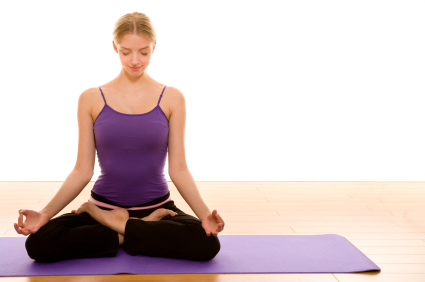 Gong Meditation Timers Have Soothing Acoustic Sounds Indeed, fellow mind-body researchers are finding more evidence that meditation and spiritual practices can influence the body in elemental ways.
Dr. Dean Ornish, professor of medicine and founder of the Preventive Medicine Research Institute at the University of California at San Francisco, recently found a relationship between meditation and genes in prostate cancer.
“This is an important pilot study showing that meditation alone may favorably alter gene expression in whole blood,” Ornish said. “These findings provide additional evidence to our recent study in PNAS [the Proceedings of the National Academy of Sciences] showing that meditation — when combined with better nutrition and moderate exercise — also favorably altered gene expression in prostate tissue.”
But researchers warn that only preliminary steps have been taken toward establishing a connection between genes and meditation.
“It’s on the limits of sensitivity of where we can go on genomics and proteomics,” said Towia Libermann, co-author of the study and director of the Beth Israel Deaconess Medical Center Genomics Center in Boston. “We can’t go into the brain itself, so a lot of what we do is going on in the blood.”
That difficult step from brain to blood can make research to link meditation and genetics difficult.
“Things happen, and genes get turned on or turned off — the genes make RNA, then the RNA makes proteins,” said Dr. Charles Raison, clinical director of the Mind Body Program in the department of psychiatry and behavioral sciences at Emory University in Atlanta.
Raison said it is those final proteins in the process that have a significant effect on the body, and sometimes RNA doesn’t end up making those proteins. Since genomic analysis measures only the RNA in the blood, it can’t guarantee that RNA had a specific effect on the body.
“Not everything gets down to the business end of the gun,” said Raison, who would also have liked to see more definition of what meditation means in the study as opposed to including any forms of repetitive prayer or yoga.
Future Thoughts for Study
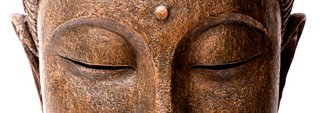 Buddha “Before you can say meditation does X, you’ve got to have a sense of what you mean by meditation,” Raison said. “There’s data to suggest that different meditative practices have different physical effects.”
Yet Raison found the stress-related study intriguing.
“The study is consistent with other lines of emerging research, including ours,” said Raison, who noted that lonely people have similar stress-related gene expression as the nonmeditating group in the study.
Another study by Dr. Richard Davidson at the University of Wisconsin found that people who were taught to meditate after a vaccination developed more antibodies to the virus than people who did not meditate afterward, Raison said.
According to Raison, it all falls in line with a modern-day misfiring of “danger pathways” that ramp up the body for fight or flight but also turn down the immune system and increase inflammation. If the meditation study proves correct, it could help stem these changes, along with exercise and diet.
“The gene changes have a lot to do with things that cause wear and tear on the body and the brain,” said Raison. “Diabetes, cardiovascular disease, dementia, many diseases in the modern world are linked to this sort of wear and tear.”
The researchers in the stress study would like to next focus on these types of individual diseases.
“If you’re about to be torn apart by a tiger, these stress responses are adaptive,” Raison said. “But if my boss is yelling at me every morning, these ancient responses are activated, but they are not useful.”
adapted from abcnews.com by Lauren Cox
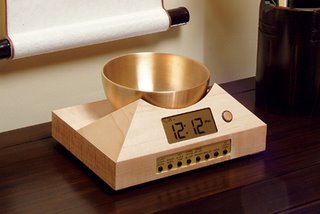 Gong Meditation Timers for Your Stillness Practice Although meditation can be done in almost any context, practitioners usually employ a quiet, tranquil space, a meditation cushion or bench, and some kind of timing device to time the meditation session. Ideally, the more these accoutrements can be integrated the better. Thus, it is conducive to a satisfying meditation practice to have a timer or clock that is tranquil and beautiful. Using a kitchen timer or beeper watch is less than ideal. And it was with these considerations in mind that we designed our digital Zen Alarm Clock and practice timer. This unique “Zen Clock” features a long-resonating acoustic chime that brings the meditation session to a gradual close, preserving the environment of stillness while also acting as an effective time signal.
It’s exquisite sounds summon your consciousness out of your meditative state with a series of subtle gongs. Once you experience the Zen Timepiece’s progressive tones, you’ll never want to meditate any other way. It serves as the perfect meditation timer. Available in 5 wood styles, including bamboo.
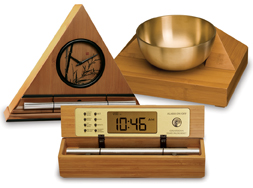 Bamboo Gong Meditation Timer and Chime Clocks Now & Zen – The Gong Meditation Timer Shop
Downtown Boulder
1638 Pearl Street
Boulder, CO 80302
(800) 779-6383
Posted in Well-being, Yoga Timer, Zen Timepiece by Now & Zen, Zen Timers
 Soothing Gong Meditation Timers - It's exquisite sounds summon your consciousness out of your meditative state with a series of subtle gongs. (HealthDay News) — There are many forms of mediation, most of which are rooted in ancient tradition.
For many people, it’s a great way to relax and soothe stress.
Here’s a summary of meditation’s common principles, courtesy of the U.S. National Institutes of Health’s National Center for Complementary and Alternative Medicine:
- Find a quiet place with little sound or distracting activity.
- Find a position that’s comfortable for you, including sitting, lying down, walking or standing.
- Focus completely on meditation, which in practice may include repeating a word or phrase, focusing mentally on an object or focusing on breathing in a certain way.
- Have an open mind and learn to acknowledge life’s distractions without necessarily judging or acting on them.
- Set your Gong Meditation Timer for 20 minutes and relax.
adapted from abcnews.com by By Diana Kohnle
Although meditation can be done in almost any context, practitioners usually employ a quiet, tranquil space, a meditation cushion or bench, and some kind of timing device to time the meditation session. Ideally, the more these accoutrements can be integrated the better. Thus, it is conducive to a satisfying meditation practice to have a timer or clock that is tranquil and beautiful. Using a kitchen timer or beeper watch is less than ideal.
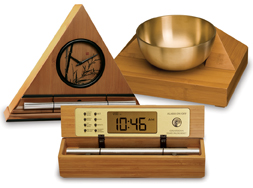 Gong and Chime Meditation Timers and Clocks
And it was with these considerations in mind that we designed our Zen Alarm Clock and practice timer. This unique “Zen Clock” features a long-resonating acoustic chime that brings the meditation session to a gradual close, preserving the environment of stillness while also acting as an effective time signal.
The Zen Clock can be programmed to chime at the end of the meditation session or periodically throughout the session as a kind of sonic yantra. The beauty and functionality of the Zen Clock/Timer makes it a meditation tool that can actually help you “make time” for meditation in your life.
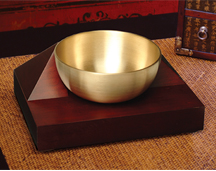 Gong Meditation Timers - preserving the environment of stillness. Now & Zen – The Gong Meditation Store
Downtown – Boulder, Colorado
1638 Pearl Street
Boulder, CO 80302
(800) 779-6383
orders@now-zen.com
Posted in Well-being, Yoga Timer, Zen Alarm Clock, Zen Timepiece by Now & Zen, Zen Timers
« Previous Page — « Previous Entries
Next Entries » — Next Page »
|
|
|
|